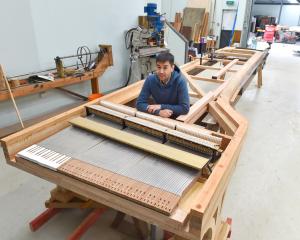
Paternal approach will not solve the problem
I was disappointed to see some of the recommendations from Hugh Askerud around what needs to happen to reduce alcohol harm among the student community (Opinion ODT 28.11.24).
For a piece focused on harm reduction, two of the three of recommendations are counterintuitive, and would hinder the leagues of progress that have been made. To broaden the scope of Campus Watch would be detrimental to the progress made so far - Campus Watch are not the police, nor should they have the responsibility of them.
The success of Campus Watch has relied on the trust they have built up with the student community. To broaden their scope (which to me suggests them taking a more active role in policing alcohol consumption) would risk undermining that, and reduce the positive impact they have had to support alcohol harm reduction in the student community.
Further, the idea of ‘‘clamping down on drinking in halls’’ is very short-sighted. If students cannot drink in halls, they will go somewhere else. Punitive measures like this will do nothing to clamp down on harmful drinking. This recommendation goes directly against the thesis of providing safe venues for students to drink that is carried through the rest of his piece.
The drive to improve student safety must be student-led with support from other bodies such as the university and police. Organisations such as OUSA and Hold On To Your Friends have been making huge progress in this area. A paternal approach by the university will not work, runs a significant risk of undermining the progress made through a trust-based, collaborative approach over the past years.
Quintin Jane
Wellington
[Quintin Jane is a former president of the Otago University Students Association. — Editor.]
Lack of leadership
It is indeed a strange world we live in when one man through the lack of leadership of another can divide a country the way New Zealand is at the moment. For many many years we have lived alongside Maori in relative peace. Now thanks to the action of David Seymour this country has a great crack right down the middle - it is going to take a great effort to get back to where we were before he pushed this on us.
How many of us have concrete evidence of Maori receiving better treatment and special consideration? It is interesting to note there is not much coming from the other members of Act New Zealand on this matter. You will never hear David Seymour speak on the real issues we face as a country. Poverty, homelessness, health, unemployment, the disabled community do not feature and definitely nothing about Dunedin Hospital.
Why are we being swept up in the rhetoric of one man and his ego?
Christopher Luxon keeps telling us all he is honouring his coalition agreement with Act New Zealand. He obviously needs a reminder of his vote-catching pre-election promise with regards to the building of Dunedin hospital because he has no trouble back-tracking on that.
Mary Laurenson
Balclutha
[Abridged, length. — Editor]
A failed government
I have said it before and I need to say it again - the government will not back down and build the hospital right. They do not have the courage to admit they need to change their mind and build it to specification - as they promised.
We have a failed government and if we don’t get rid of this promise-breaking, southern-region-bashing and putting-roads-before-people coalition we will get a second-rate hospital.
I call for a snap election.
Gio Angelo
Belleknowes
Here the sea comes, if you are ready or not
Re Mr Williams’ letter (ODT 18.11.24). Sea level refers to the tidal range on a day to day basis. The damage done by sea-level change refers to the physics and energy involved over longer periods of time and includes the Milankovitch natural cyclical variations of planetary orbits over hundreds of thousands of years plus atmospheric changes. The end result is gradual erosion and encroachment of the oceans but also storm surge and cliff collapse that occur over shorter periods of time.
The emergence of life on our planet has had a continuous impact on the composition of our atmosphere, turning what was largely a methane atmosphere into our present life-sustaining carbon dioxide and oxygen.
There are and always have been natural variation over long periods of time. Today we are concerned about the emission of greenhouse gases and the accelerated melting of glaciers. Nasa claims 1kg of carbon dioxide melts 12kg of ice.
The phenomenon of greenhouse gases was discovered in 1856 and 1859 by an American woman Eunice Newton Foote and John Tyndall, the Irish chemist who studied glacial retreat. Both independently demonstrated that carbon dioxide and water vapour raised global temperatures by trapping infrared radiation in our lower atmosphere.
Thus long before any actual encroachment of the oceans, Waitaki Boys’ High School’s playing grounds will disappear if the current processes continue. There are many coastlines, farmlands and human settlements around the world succumbing to this process. The sooner we implement solar and wind generation and electrify transport the better.
Stuart Mathieson
Palmerston
Live animal exports are a cruel return
It is unacceptable to send live animals to countries with inadequate or non-existent animal welfare protection legislation or anti-cruelty laws. Cruelty, inhumane treatment and prolonged animal suffering are common in countries such as China, the Middle East and the Pacific Islands, among others. Under New Zealand’s Animal Welfare Act 1999 many of the practices involving animals in countries of destination for live export would be illegal and subject to criminal prosecution.
The Animal Welfare Act recognises that ‘‘animals are sentient’’. By reinstating live export, the National government and those farmers supplying stock are knowingly complicit in condoning and supporting animal cruelty, mistreatment and suffering. The decision to restart live export shows unequivocally that profit is prioritised over animal welfare.
Resuming live export discredits New Zealand internationally and makes a mockery of our claim to uphold and be a leader in high standards of animal welfare.
Claire Valpy
Auckland
It’s Key’s fault
I believe the current financial strife can be traced back to the decision of the Key government to cancel the payments into the Cullen fund. John Key said at the time it didn’t make sense to borrow money and pay interest to buy shares. Normally he may have been right, but not at that time.
Many New Zealanders understand a half price or closing down sale. Well, this is exactly what that period was for shares, except that many shares would have been even less than half price, perhaps a fifth in some cases. Six or eight years of payments of $2-2.5 billion ($15-20b) could well have been turned into $50b or more and been used to pay for coronavirus costs, avoiding generational debt we are now in and perhaps reducing the panic on interest rates and the inflation distress we are now suffering.
George Livingstone
Roslyn
Address Letters to the Editor to: Otago Daily Times, PO Box 517, 52-56 Lower Stuart St, Dunedin. Email: editor@odt.co.nz













